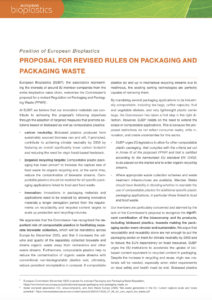 European Bioplastics (EUBP), the association representing the interests of around 80 member companies from the entire bioplastics value chain, welcomes the Commission’s proposal for a revised Regulation on Packaging and Packaging Waste (PPWR). EUBP believes that innovative materials, particularly biobased and compostable plastics, can contribute to achieving the PPWR’s objectives through the adoption of targeted measures that promote solutions based on these materials.
European Bioplastics (EUBP), the association representing the interests of around 80 member companies from the entire bioplastics value chain, welcomes the Commission’s proposal for a revised Regulation on Packaging and Packaging Waste (PPWR). EUBP believes that innovative materials, particularly biobased and compostable plastics, can contribute to achieving the PPWR’s objectives through the adoption of targeted measures that promote solutions based on these materials.
The association appreciates the Commission’s recognition of the important role of compostable plastics in facilitating separate biowaste collection, which will be mandatory across Europe by December 2023.
Compostable plastics can increase the volume and quality of separately collected biowaste, divert organic waste away from incineration and other waste streams, reduce the contamination of organic waste streams with conventional non-biodegradable plastics, and ultimately reduce persistent microplastics in compost.
The Commission has taken a first step in the right direction by mandating several packaging applications to be industrially compostable, including tea bags, coffee capsules, fruit and vegetable stickers, and very lightweight plastic carrier bags.
However, EUBP insists on the need to extend the scope of compostable applications. The association urges EU legislators to allow for other compostable plastic packaging that complies with the criteria set out in Annex III of the proposed PPWR and that is certified according to the harmonized EU standard EN 13432 to be placed on the market and to enter organic recycling streams. Member States should have flexibility in deciding whether to mandate the use of compostable plastics for additional specific plastic packaging applications, particularly those linked to food and food waste.
EUBP is particularly concerned by the lack of the Commission’s proposal to recognize the significant contribution of the bioeconomy and its products, including biobased plastics, towards making the packaging sector more circular and sustainable. The association argues that recyclability and reusability alone are not enough to put the packaging sector on track for climate neutrality by 2050 and to reduce the EU’s dependency on fossil resources.
Biobased plastics can help to reduce the environmental impact of plastics and packaging by featuring an overall significantly lower carbon footprint. Despite the increase in recycling and reuse, virgin raw materials will be needed, especially when strict requirements on food safety and health must be met. Therefore, EUBP calls for biobased content to count as equivalent towards the recycled content targets set out in the PPWR proposal.
In addition, EUBP considers it vital for the EU to enable and champion innovation to ensure that the packaging sector is fit for the future and moving towards a sustainable and circular economy model. However, the Commission’s legislative proposal sets overly rigid hurdles for innovative materials, which will most certainly stifle the industry’s investments into R&D of innovative materials. The current proposal risks shutting down entire European businesses in the sector and moving investments and innovation outside of Europe.
Thus, EUBP urges EU legislators to review the requirements on recyclability and recycled content targets for innovative materials and allow for a 10-year derogation period for innovative materials and polymers to scale up the necessary processes and infrastructure.
To receive more detailed information on the PPWD revision and European Bioplastics’ view on the individual elements, please read EUBP’s position papers and press release:
- Proposal for revised rules on packaging and packaging waste
- Proposal for revised rules on packaging and packaging waste, incl. proposed amendments
- A biobased content target (in the context of the PPWR)
- Compostable coffee capsules (in the context of the PPWR)
- Press release: Why coffee capsules should be compostable